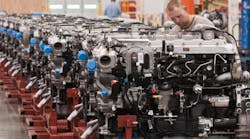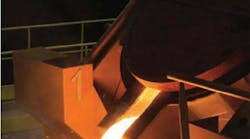Giddings & Lewis is closing its Menominee, MI, foundry in response to a strike that has driven away core customers and reduced the possibility of a facility sale. Stephen M. Peterson, president and CEO of Giddings & Lewis, explained that the sale was scheduled prior to the strike.
Fond du Lac, WI-based Giddings & Lewis is a subsidiary of Germany's Thyssen Krupp Technologies.
According to local reports, Peterson said the sale was planned because the foundry was no longer a core element of Giddings & Lewis' metal-cutting business. Notified of the sell-off strategy, the local union sought assurances of job security. "We explained to the union at the bargaining table on many occasions that the inclusion of the 'security clause' in the contract would not increase the security of the union members because it would make it substantially more difficult for a buyer to purchase the foundry," Peterson said. After some negotiations, the union began a strike on September 27.
The workers are represented by the Glass, Molders, Pottery, Plastics & Allied Workers International Union.
"We explained to the union that a strike could cause irreparable damage to the foundry from the very beginning. Because many of our customers depend on us for 'just in time' delivery, they could not wait for 'normal' strike negotiations to resolve the dispute," according to Peterson.
"During the first few days of the strike, it became clear that unless the strike ended very quickly, the financial impact to the business would be significant and potentially irreparable. Due to the severity of the situation, we met with the federal mediator and the union negotiating team to ask the membership to reconsider their position and vote on the contract. The contract offer was presented for a vote, and unfortunately, on October 4, the membership voted to reject the offer and not return to work," the executive said.
According to Giddings & Lewis, a potential purchaser decided against buying the foundry because of the concessions that would have been needed to secure a labor contract.



